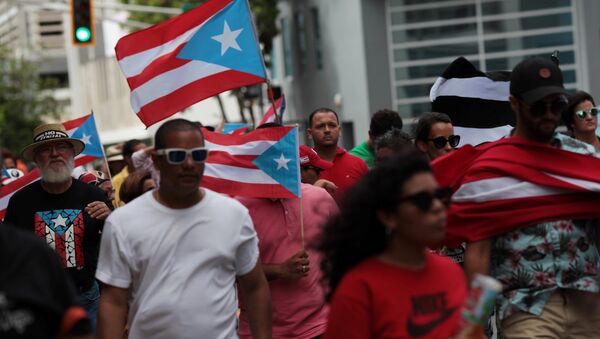Although Puerto Ricans have enjoyed US statutory citizenship since 1917, they receive less federal funding than the American states and cannot cast ballots in US presidential elections. It is not the first time that the nation will go to the polls to decide its status, however, this year Puerto Ricans will have to answer "yes" or "no" to just one direct question.
In the event that the majority of those participating in the non-binding referendum vote for admission, the US Congress will have to consider whether or not to accept the island. To date, American congressmen have never acted on Puerto Rico's previous five referendum results, according to the Associated Press. For its part, Bloomberg cites President Donald Trump, who stated in 2018 that he would say “absolute no” to Puerto Rico's admission.
Could the US Become the 51st State Soon?
Puerto Rico's admission to the union is "a mirage, a fantasy, and an illusion, promoted by a group of Puerto Rican politicians to be elected," says Efraín Vázquez-Vera, a professor at the University of Puerto Rico. He draws attention to the fact that never in US history has a non-incorporated territory become a US state.
"Corruption and incompetence branded the actual pro-statehood government," he says. "The people are very angry and not willing to vote in the next November general election. Doing the plebiscite at the same time as the general election it is a way to guarantee the participation of Pro-Statehood voters. So, for the pro-statehood party, is not important to win or lose the plebiscite, they want to win the general election and to retain the political power."
According to Vázquez-Vera, the last three plebiscites had a decrease in the number of pro-statehood votes. Currently there are about 35-40% pro-statehood voters, he says, adding that the next referendum "will be just another expensive poll". Besides, the White House and the US Senate have expressed that they will not consider a statehood plea, the professor remarks.
"Statehood will probably lose, but the pro-statehood government will retain power," the academic predicts. "That is what really matters for them. Why, because pro-statehood is not the majority and the opposition are very divided."
'It's Not in the Interest of the US to Annex a Proud Latin American Nation'
Over the last 122 years, the United States Congress has never considered the possibility of statehood for Puerto Rico as a viable option to resolve the status dilemma, admits Javier Hernández, the author of “PREXIT: Forging Puerto Rico’s Path to Sovereignty”, a Puerto Rican writer, diaspora activist and former federal officer based in New Jersey.
"Essentially, statehood will never happen for Puerto Rico because it is not in the US national interest to annex a proud Latin American nation that has resisted over a century of American assimilation policies, refuses to accept English as their only official language, and is constantly reaffirming its national identity and aspirations of freedom," the author observes.
Those who advocate the island's incorporation as the 51st state of the US do so to "increase dependency" and "have access to more food stamps and federal funds ($10 billion to be exact)," the writer opines. According to him, "statehood would have dire political, social, and economic consequences for the United States by propping up an expensive colonial dependent economy, funded by American taxpayers". Hernandez recollects that in 2014 the US General Accountability Office (GAO) released a detailed report about how costly it would be for the US to admit Puerto Rico.
The author echoes Efraín Vázquez-Vera by saying that the "statehood party has a long history of corruption". Furthermore, it is also infamous for "persecution of the political opposition, namely pro-sovereignty advocates", according to him.
"Thankfully, the pro-sovereignty movement is gaining in strength. In the 2012 status plebiscite, the combined sovereignty options of independence and free association garnered 39% of the vote, demonstrating that sovereignty, particularly free association, has the largest growth margin of all political forces in Puerto Rico," the writer concludes.




